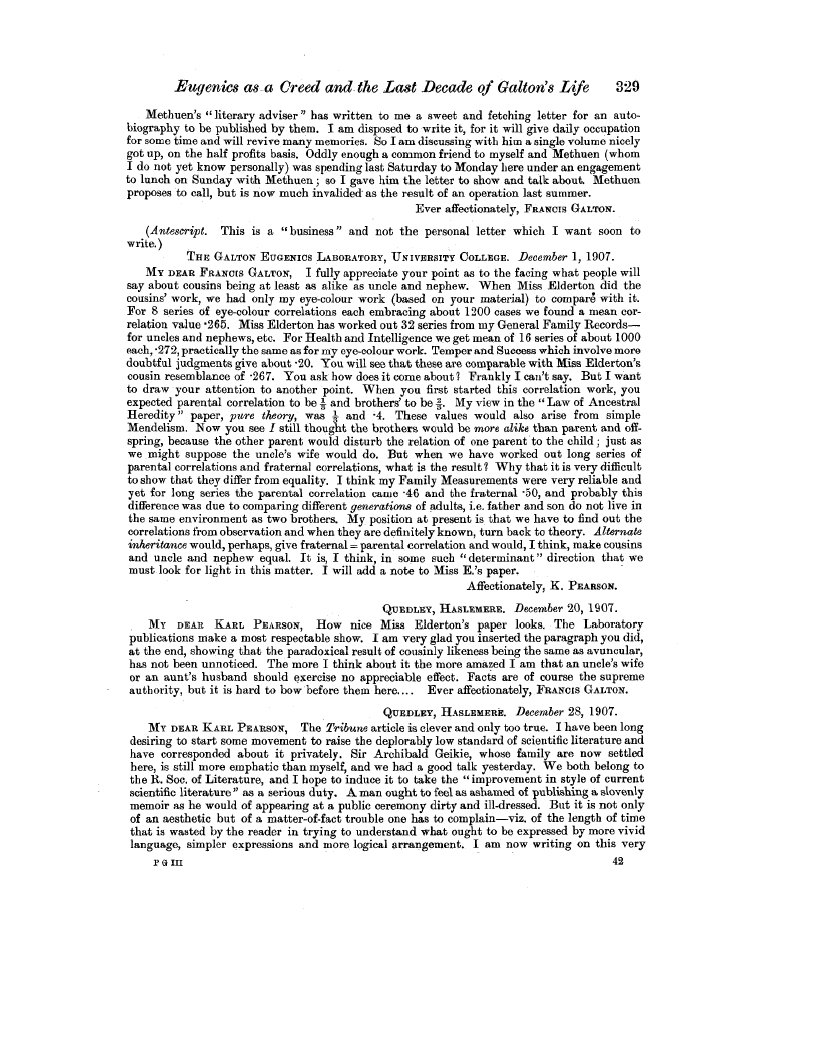| ||||||

OCR Rendition - approximate
Eugenics as..a Creed and. the Last Decade of Galton's Life 329 Methuen's "literary adviser" has written to me a sweet and fetching letter for an autobiography to be published by them. I am disposed to write it, for it will give daily occupation for some time and will revive many memories. So I am discussing with him a single volume nicely got up, on the half profits basis. Oddly enough a common friend to myself and Methuen (whom I do not yet know personally) was spending last Saturday to Monday here under an engagement to lunch on Sunday with Methuen ; so I gave him the letter to show and talk about, Methuen proposes to call, but is now much invalided as the result of an operation last summer. Ever affectionately, FRANCIS GALTON. (Antescript. This is a "business" and not the personal letter which I want soon to write.) THE GALTON EUGENICS LABORATORY, UNIVERSITY COLLEGE. December 1, 1907. MY DEAR FRANCIS GALTON, I fully appreciate your point as to the facing what people will say about cousins being at least as alike as uncle and nephew. When Miss Elderton did the cousins' work, we had only my eye-colour work (based on your material) to compare with it. For 8 series of eye-colour correlations each embracing about 1200 cases we found a mean correlation value •265. Miss Elderton has worked out 32 series from my General Family Recordsfor uncles and nephews, etc. For Health and Intelligence we get mean of 16 series of about 1000 each, -272, practically the same as for my eye-colour work. Temper and Success which involve more doubtful judgments give about •20. You will see that these are comparable with Miss Elderton's cousin resemblance of •267. You ask how does it come about? Frankly I can't say. But I want to draw your attention to another point. When you first started this correlation work, you expected parental correlation to be and brothers' to be 3. My view in the "Law of Ancestral Heredity" paper, pure theory, was ~ and -4. These values would also arise from simple Mendelism. Now you see I still thought the brothers would be more alike than parent and offspring, because the other parent would disturb the relation of one parent to the child ; just as we might suppose the uncle's wife would do. But when we have worked out long series of parental correlations and fraternal correlations, what is the result? Why that it is very difficult to show that they differ from equality. I think my Family Measurements were very reliable and yet for long series the parental correlation came •46 and the fraternal •50, and probably this difference was due to comparing different generations of adults, i.e. father and son do not live in the same environment as two brothers. My position at present is that we have to find out the correlations from observation and when they are definitely known, turn back to theory. Alternate inheritance would, perhaps, give fraternal = parental correlation and would, I think, make cousins and uncle and nephew equal. It is, I think, in some such "determinant" direction that we must look for light in this matter. I will add a note to Miss E.'s paper. Affectionately, K. PEARSON. QUEDLEY, HASLIUIERE. December 20, 1907. MY DEAR KARL PEARSON, How nice Miss Elderton's paper looks. The Laboratory publications make a most respectable show. I am very glad you inserted the paragraph you did, at the end, showing that the paradoxical result of cousinly likeness being the same as avuncular, has not been unnoticed. The more I think about it the more amazed I am that an uncle's wife or an aunt's husband should exercise no appreciable effect. Facts are of course the supreme authority, but it is hard to bow before them here.... Ever affectionately, FRANCIS GALTON. QUEDLEY, HASLEMERE. December 28, 1907. MY DEAR KARL PEARSON, The Tribune article is clever and only too true. I have been long desiring to start some movement to raise the deplorably low standard of scientific literature and have corresponded about it privately. Sir Archibald Geikie, whose family are now settled here, is still more emphatic than myself, and we had a good talk yesterday. We both belong to the R. Soc. of Literature, and I hope to induce it to take the `° improvement in style of current scientific literature" as a serious duty. A man ought to feel as ashamed of publishing a slovenly memoir as he would of appearing at a public ceremony dirty and ill-dressed. But it is not only of an aesthetic but of a matter-of-fact trouble one has to complain-viz. of the length of time that is wasted by the reader in trying to understand what ought to be expressed by more vivid language, simpler expressions and more logical arrangement. I am now writing on this very r G 111 42
|